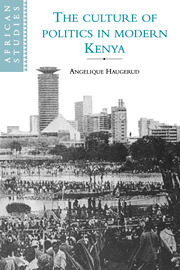Book contents
- Frontmatter
- Contents
- List of maps
- List of tables
- Preface
- 1 Introduction: staging politics in Kenya
- 2 Shattered silences: political culture and “democracy” in the early 1990s
- 3 Open secrets: everyday forms of domination before 1990
- 4 Moral economy and the quest for wealth in central Kenya since the late nineteenth century
- 5 The dove and the castor nut: Embu household economy in the 1980s
- 6 Conclusions: the showpiece of an hour
- Notes
- Bibliography
- Index
- Titles in the series
5 - The dove and the castor nut: Embu household economy in the 1980s
Published online by Cambridge University Press: 05 June 2012
- Frontmatter
- Contents
- List of maps
- List of tables
- Preface
- 1 Introduction: staging politics in Kenya
- 2 Shattered silences: political culture and “democracy” in the early 1990s
- 3 Open secrets: everyday forms of domination before 1990
- 4 Moral economy and the quest for wealth in central Kenya since the late nineteenth century
- 5 The dove and the castor nut: Embu household economy in the 1980s
- 6 Conclusions: the showpiece of an hour
- Notes
- Bibliography
- Index
- Titles in the series
Summary
Introduction
This chapter is the final step of an analysis that has taken us from the “seditious” music and social protest of Nairobi's political culture in the early 1990s, to strategic public silences preserved in earlier years, and to daily struggles for livelihood in the countryside during the past century. Now let us take a close look at the lives of small farmers in Embu in the late 1970s and 1980s. This narrative highlights the local uncertainties, contests, and social asymmetries that both reflect and fuel the “high politics” of the state. Again one recognizes cultural and conceptual continuities between smallscale and largescale organization: from kin group elder, to chief, cabinet minister, and head of state (cf. Kopytoff 1987: 52). Hence the frequent inclusion in Kenyan political rhetoric of metaphors of bridewealth, marriage, and fatherhood: allusions to a moral universe to which many people do have deep attachments. To suggest that an official has betrayed citizens' trust in the manner of a father who squanders a son's bridewealth savings is to strike a resonant chord. (An elder publicly made such an assertion about local coffee cooperative society officials during a 1980 baraza in rural Embu.) To speak of “state–local” interactions and “above-below” dichotomies can suggest misleadingly discrete categories of social interaction and moral imperatives.
Presumed boundaries between town and countryside, like those between state and locality, are fuzzy at best.
- Type
- Chapter
- Information
- The Culture of Politics in Modern Kenya , pp. 139 - 191Publisher: Cambridge University PressPrint publication year: 1995



